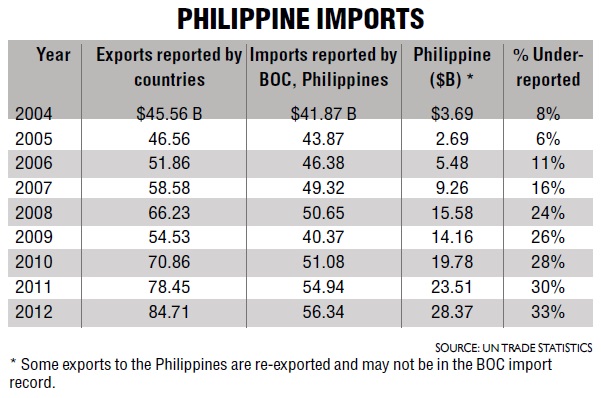Smuggling not limited to rice
Lately, there has been much publicity about rice smuggling. But this is just the tip of the iceberg. The expansion of smuggling is not limited to agricultural products, which constitute only 12 percent of our imports.
Consider the table below.
Analysis
Note that smuggling decreased only in 2005. This was because there was an effective check and balance mechanism to monitor and guide the Bureau of Customs (BOC). This was the Cabinet Oversight Committee Against Smuggling (Cocas). That year, underreported (mostly smuggled) imports decreased from $3.69 billion (8 percent) to $2.69 billion (6 percent).
The committee was chaired at that time by Interior Secretary Angelo Reyes. The members were high level representatives, usually undersecretaries of relevant departments like Finance, Agriculture, Trade, and Justice. They were joined by representatives from the private sector—Alyansa Agrikultura for agriculture and Federation of Philippine Industries for industry.
The committee met at least once a month. The BOC had no choice but to respond to Cocas members’ questions and recommendations. However, in 2006, Cocas was abolished. It had become too successful, for it exposed high-level officials involved in smuggling.
Since then, as the table shows, underreported (mostly smuggled) imports rose from $2.69 billion (6 percent) to $28.37 billion (33 percent) in 2012. Though trade increased by 1.9 times, underreported imports increased by 7.7 times.
Impact
In his last state of the nation address, President Aquino said the government lost an average of P200 billion a year to smuggling. This is 200 times worse than the P10-billion loss which Napoles allegedly engineered in a scam spanning 10 years.
Is the P200 billion estimate an exaggeration? It is not.
Assuming 12 percent VAT and an average 5 percent tariff rate, the resulting revenue loss from the $28.37 billion in underreported 2012 imports may result in $4.82 billion, or P216.9 billion. This is very close to the Sona estimate.
If lost revenue is important, how much more painful is the loss of existing jobs due to smuggling? Add to this is the loss of potential investors, who can provide additional.
Take, for example, the DA Bureau of Agricultural Statistics report that 20 percent of our small backyard hog producers lost their livelihood over a two-year period, mostly because of smuggling.
Agriculture leaders wrote three times in as many years to the President and recommended specific actions to reduce smuggling. Unfortunately, they were rejected every time by the staff of the Office of the President.
Structural change
Consequently, because of a possible “cordon sanitaire,” smuggling has become even more rampant. However, with the President’s directive and the new BOC management under Finance Secretary Cesar Purisima’s guidance, the anti-smuggling drive has significantly improved. It also helped the newly created National Competitiveness Council’s Committee on Anti-Smuggling and Import-Export Documentation.
This committee pales in comparison to the Cocas. The highest official on board is an assistant secretary, with only assistant division chiefs sometimes representing the other departments. Nevertheless, there is now some transparency regarding BOC activities. Though there have been significant accomplishments (an example of which is the BOC now provides important documents like the Inward Foreign Manifest), they are still far from what can be accomplished with a high level Cocas.
Will this committee be upgraded? Or will it be abolished once it becomes significantly successful, as what happened under the previous administration?
Legislation
During the Jan. 22 Senate hearing, the Alyansa Agrikultura was asked what amendments they wanted in the Tariff and Customs Code. It identified the creation of a public-private sector body like the Cocas. This has a precedent in the legislated public-private sector National Agriculture and Fisheries Council (NAFC). The NAFC helps the Department of Agriculture, just as the Cocas had helped the BOC.
Many of the BOC reforms needed to reduce smuggling can be carried out with Cocas guidance, without need for legislation. But legislation is required to ensure that the Cocas will be permanently in place. While waiting for this, the high level Cocas should be created immediately to accelerate the momentum of the praiseworthy reforms the BOC is now undertaking.
(The author is chair of Agriwatch, former secretary for Presidential Flagship Programs and Projects, and former undersecretary for agriculture, trade and industry. For inquiries and suggestions, e-mail [email protected] or telefax 8522112.)















